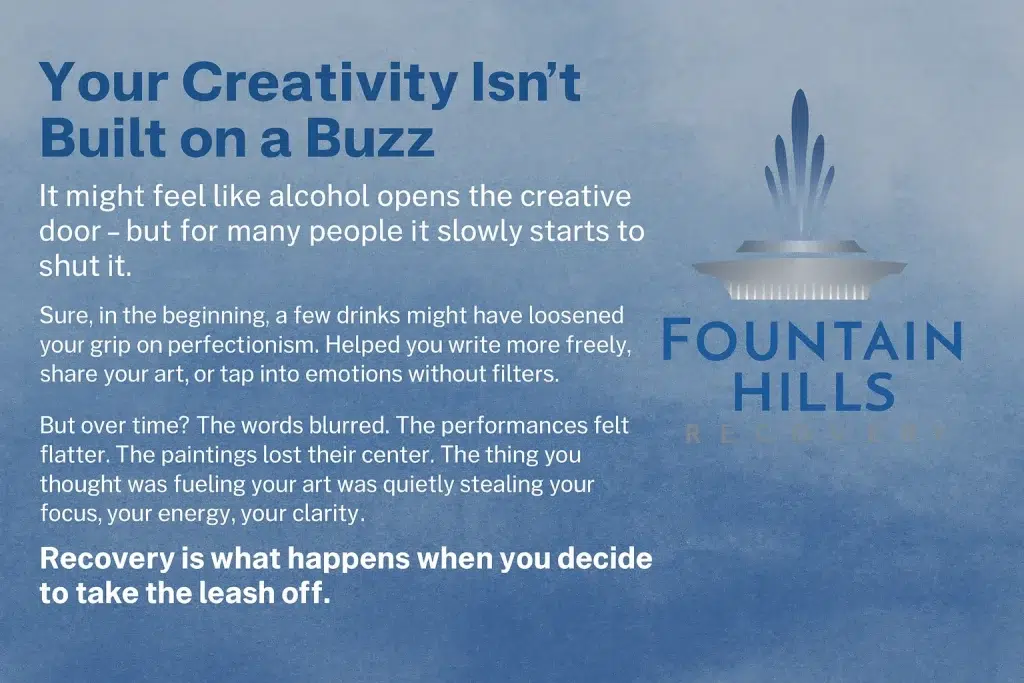There’s a very specific fear that keeps some of the most emotionally rich, creative people from seeking help:
If I get sober… what happens to the part of me that feels? That writes? That connects?
At Fountain Hills Recovery, we’ve heard it time and time again—from songwriters, writers, actors, deep thinkers, and everyday people with complex inner worlds.
The fear isn’t just about losing alcohol. It’s about losing identity. Losing access to what makes life feel meaningful. Losing the edge that made you interesting.
We get it. And we want to tell you something honest and hopeful:
Your creativity isn’t going anywhere. In fact, it’s about to get clearer.
Our residential treatment program doesn’t dull your spirit. It makes space for it to breathe, create, and grow—without burning you out from the inside.
Your Creativity Isn’t Built on a Buzz
It might feel like alcohol opens the creative door—but for many people, it slowly starts to shut it.
Sure, in the beginning, a few drinks might have loosened your grip on perfectionism. Helped you write more freely, share your art, or tap into emotions without filters.
But over time? The words blurred. The performances felt flatter. The paintings lost their center. The thing you thought was fueling your art was quietly stealing your focus, your energy, your clarity.
Creativity that depends on alcohol becomes creativity on a timer—and eventually, a leash.
Recovery is what happens when you decide to take the leash off.
Early Recovery Isn’t Blank—It’s Quiet
One of the most surprising parts of residential treatment is how quiet it feels at first.
Not boring. Not empty. Just… still.
If you’re used to chaos, noise, or late-night creative bursts fueled by adrenaline or substances, that stillness might feel unfamiliar. Maybe even a little scary.
But here’s what lives inside that quiet:
- Rest
- Insight
- Presence
- Room to listen to your own voice again
You don’t lose your energy. You stop leaking it. And when your body starts to stabilize, your mind and creativity often show up more grounded—and more honest—than ever.
You Don’t Have to Be Anyone But Yourself
In a world that often asks creatives to perform—be interesting, be expressive, be productive—it can feel strange to just be.
That’s one of the biggest reliefs clients feel inside our residential program. You don’t have to impress anyone. You don’t have to be “the intense one” or “the funny one” or “the deep one.” You just get to be human.
And from that place? Authentic expression starts to return.

Creative Expression Is Encouraged, Not Shamed
Some treatment centers are rigid. Structured to the point of suppression. But we believe healing and creativity go hand in hand.
At Fountain Hills Recovery, clients often journal, paint, write, and explore expressive outlets as part of their healing—not as an extra, but as an essential part of self-return.
We’ve had clients bring guitars, sketchbooks, even embroidery hoops. One client choreographed dance routines on our patio. Another started writing a play based on their group therapy sessions.
We don’t interrupt that energy. We honor it.
If you’re looking alcohol treatment services in Scottsdale, make sure the program you choose sees your creativity not as a liability, but as a lifeline.
Therapy Helps You Make Sense of the Story You’ve Been Carrying
Creative people are often excellent at telling stories. But sometimes those stories are incomplete. Or rehearsed. Or built around survival.
In therapy, you don’t just look at behaviors. You look at meaning. You ask:
- What was alcohol helping me avoid?
- What feelings do I not know how to hold without numbing?
- What version of myself am I afraid will disappear in sobriety?
The answers aren’t always easy—but they’re real. And they often become the beginning of your most honest creative work.
You Don’t Need to Hit Rock Bottom to Need Support
We work with a lot of clients who are still functioning. Still working. Still showing up for people. They don’t always fit the stereotype of “needing treatment.”
But they know, somewhere deep down, that something is off. Their creative energy is running dry. Their drinking has shifted from social to habitual. Their emotions feel either too big—or too far away.
You don’t need to wait for a crisis to reclaim yourself. You’re allowed to want more—even if things look “fine” on the outside.
Real-Life Glimpses of Creative Return
One client who was stuck in a creative rut for years found themselves waking up early to write again—sober, focused, and clear.
Another, a former musician, told us they cried after picking up their guitar for the first time in weeks—not because they missed drinking, but because they could feel the music again.
These moments don’t happen because we force creativity. They happen because our environment helps people feel safe enough to let it back in.
FAQs for Creative Clients Considering Residential Treatment
Will sobriety make me less expressive?
Early sobriety can feel muted—but that’s part of recalibration. Once your body and mind adjust, many clients report feeling more expressive and emotionally available than they have in years.
Will I be able to write, draw, or create in treatment?
Yes. We encourage creative expression and understand that for many people, art is part of their healing. There’s time and space for you to reconnect with whatever form feels natural.
Do I have to label myself an “alcoholic”?
No. Labels are not required. We work with people wherever they are in their understanding of substance use. You get to define your relationship with alcohol in your own words—and we’ll support you in exploring what feels true.
What if I’m scared that treatment will make me boring?
You’re not alone. Many clients fear this. But what they often find is the opposite: they become more present, more emotionally aware, and more connected—with themselves and with others.
How long is the residential program?
Programs vary, but most clients stay between 30 and 45 days. Our team works with you to create a care plan that supports healing without pausing your life indefinitely.
Your Spark Isn’t Gone—It’s Waiting for You to Come Back
The part of you that feels deeply? It’s not a problem. The part of you that creates, writes, dances, imagines? It’s not at risk.
What’s at risk is losing your connection to those things by continuing to numb them.
Recovery doesn’t erase your creative identity. It strengthens your access to it. It gives you new tools, new language, new safety. It gives you you, fully present.
Call (800) 715-2004 to learn more about our residential treatment program services in Fountain Hills, AZ. Your story isn’t over. In fact, this might be the most creative chapter yet.




